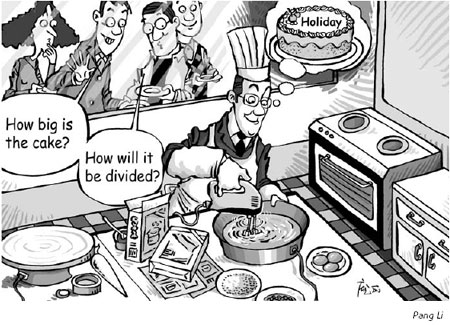History of holidays, not length, important
Updated: 2007-11-20 07:25
It is interesting to note the ongoing debate over the rearrangement of our national holidays.
Although opinions may not affect the final decision on how many holidays we are eventually to have and on what occasions, the fact that ordinary people do have an opportunity to air their views openly on the matter marks progress in our society.
After all, few public polls were conducted when we were told there would be three Golden Week holidays every year in 1999, although almost everyone welcomed the news as it meant more days for rest and recreation.

Not unexpected, the plan to cancel the week-long May Day holiday has incurred much controversy.
What is important, however, is not the differing views on whether we should keep or cancel this Golden Week and introduce three other holidays such as the Qingming or Tomb-Sweeping Day, the Dragon Boat Festival and the Mid-Autumn Festival. The crux of the matter is that the right of workers to rest should be guaranteed.
But why we should have these holidays and how we should spend them are points being overlooked in the current debate.
The establishment of the May Day Golden Week and now to reduce it to just one day is not the argument. Do we remember the origin of this day? Do we know it is International Workers' Day?
This has been forgotten in the very home where May Day became a festival for workers worldwide.
Workers in Chicago, the United States, staged demonstrations for the eight-hour working day in the 1860s and 1870s, but were suppressed by the authorities. Some workers were even killed for this right.
The suppression triggered greater demonstrations in more places and protests around the world. In 1889, Socialist International declared May 1 International Workers' Day, and since 1890 the day has been celebrated by workers around the world with rallies, speeches and other activities.
But in the United States, the home of this very special day for the labor movement, May Day and its political significance has been officially ignored and a Labor Day instead is celebrated on the first Monday of September.
It is not surprising that the establishment of the United States would want to hide the true history of May Day and attempts to erase its history and significance. It is sad that many Chinese are also not too keen on the history of May Day and its significance.
I only wish that since we now enjoy fewer working days, an outcome of the pioneering labor movement, we should show some appreciation for those who fought for the rights of workers.
And if we do care, May Day should stand as a reminder of the legitimate rights of all workers - the right to rest, health, workplace safety, and more. Be it a one-day holiday or a week-long break, May Day is more than an occasion for just fun.
If we do have the three new holidays we should also not loose sight of their traditional significance by merely eating stuffed glutinous rice cones and moon cakes.
The meaning of these holidays will be lost if they become just an occasion to eat the special foods associated with them.
All three festivals have come about from China's long civilization and have rich cultural content.
According to the task force under the National Development and Reform Commission on national holidays, the addition of the three Chinese festival holidays is designed to enhance our traditions and culture.
If so, specific work should be done to guide people to spend these holidays more culturally.
The author is a council member of China Society for Human Rights Studies
(China Daily 11/20/2007 page10)
|
|
|
|
|
|